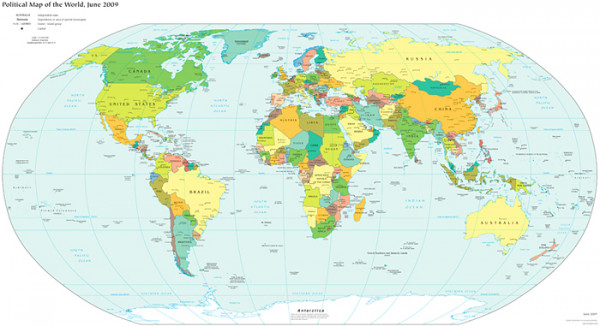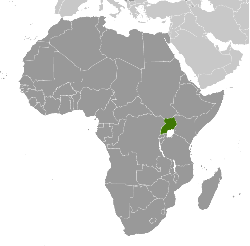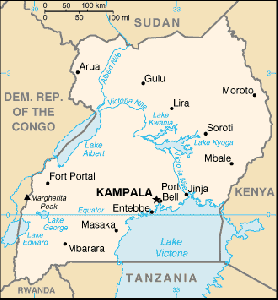Uganda
Overview
| Flag |
|
| Anthem |
Oh Uganda, Land of Beauty |
| Capital |
Kampala |
| Largest city |
Kampala |
| Official language(s) |
English / Swahili |
Demonyma name for a resident of a locality, often the same as the name of the people's native language
|
Ugandan |
| Government |
Democratic Republic |
| Area |
236,040 km2, 91,136 sq mi |
| Population |
~ 32 million |
| Currency |
Ugandan shilling (UGX) |
| Internet TLD |
.ug |
Geography
The Republic of Uganda is a
landlockeda term used to refer to a region, especially a country, that does not border the sea country in East Africa. It is bordered on the east by Kenya, on the north by Sudan, on the west by the Democratic Republic of the Congo, on the southwest by Rwanda, and on the south by Tanzania.
Most important cities are located in the south, near Lake Victoria, including Kampala and the nearby city of Entebbe. Kampala is the largest city and capital of Uganda. As of 2008, the city had an estimated population of 1,420,200.
Society and culture
Population
Uganda’s population has grown from 4.8 million people in 1950 to 33,398,682 in 2010. Uganda has a very young population, with a median age of 15 years. Uganda is home to many different ethnic groups. None of these groups forms a majority of the population. Some of the ethnic groups are: Baganda 16.9%, Banyakole 9.5%, Basoga 8.4%, Bakiga 6.9%, Iteso 6.4%, Langi 6.1%.
Languages
Around forty different languages are regularly and currently in use in the country. The most widely spoken local language is Luganda. However, English is the official national language. It is taught in schools, used in courts of law and by most newspapers and some radio broadcasts. Swahili is also widely used and an important
lingua francaa common language used by people of diverse backgrounds to communicate with one another in the northern regions.
Religion
According to the
censusan official count of members of a population of 2002, Christians made up about 84% of Uganda's population. Around 42% were Roman Catholic and 42% Protestants. The next most reported religion of Uganda is Islam, with Muslims representing 12% of the population.
Government and politics
Uganda is a republic. The President of the republic, currently Yoweri Kaguta Museveni, is both head of state and head of government. The parliament is formed by the National Assembly, which has 332 members. The judiciary power is
vestedsettled, fixed in the Court of Appeal and the High Court.
Economy
Uganda has
substantiallarge in size, amount or number natural resources, including fertile soils, regular rainfall, and sizable mineral deposits of copper and cobalt. Agriculture is the most important sector of the economy, employing over 80% of the
workforceall the workers employed by a nation. Uganda depends on Kenya for access to international markets.






